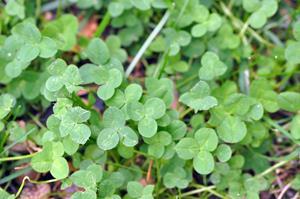Is a Bee Friendly Lawn Right For You?

Bee friendly yards are gaining in popularity and rapidly expanding to include the lawn as we look for ways to help prevent the decline of bees. Honeybees are the best-known bees but there are several native bees essential as pollinators to a variety of plants. While an easy and worthwhile concept to embrace, finding a dependable replacement for a traditional lawn may be more complicated. Typical bluegrass and tall fescue lawns provide open spaces for play, hold the soil, and prevent erosion, but provide little benefit to our pollinators. A lawn alternative that favors bees should provide a source of pollen and nectar and act as dependable ground cover.
Clover is often the first choice for an alternative bee friendly lawn. Prior to the introduction of herbicides in the 1950’s clover was a common component of lawns and valued for its ability to fix or make nitrogen, enrich the soil, and improve turf growth. As an added benefit it provides pollen for bees.
White or Dutch clover commonly found in local lawns is an option. A frequent suggestion for a bee friendly lawn is microclover. This refers to smaller, less aggressive varieties of white clover that typically have smaller leaves, fewer flowers, and a lower growth habit.
Is clover a good alternative for lawns? This question is not easily answered. While clovers grow best in moist fertile soils, they struggle in hot, dry, and compacted soils. Clovers go dormant or dieback in the heat of summer and remain fully dormant in winter. As clover thins and dies out this exposes the soil, which increases erosion and could leave a muddy mess. A bee friendly lawn alternative should provide good soil coverage year-round. Clovers often fail to provide this benefit.
There are potentially two options to a bee friendly clover lawn. One is a monoculture, and the other is a mix of traditional turf species.
Clover monocultures, meaning total removal of all fescue and bluegrass, might sound the most appealing, but in our harsh Kansas City climate this may not be the best approach. Clovers, especially microclover, do not thrive in heat and drought. They have poor shade tolerance, and the top growth dies back in winter leaving bare spots. Clovers are broadleaf plants and tend to grow in patches or clumps. The use of herbicides to control invader weeds cannot be used as they will kill the clover.
The best approach may be a mix of traditional bluegrass and tall fescue grasses overseeded with clovers. While providing pollen for bees, a clover/turf mix can provide a more uniform appearance. It offers the added benefits of better soil coverage and assists with nitrogen fixation. This can help reduce fertilizer requirements.
Research at Rutgers and Maryland Extension suggest white clover is best seeded in the spring. Reseeding may be necessary every couple of years to maintain a good coverage. White clover may be a better option for hotter climates than the trendy microclover. Research does not support an exclusively clover lawn as a ground cover, but as a component of the existing lawn.
The term bee friendly lawn alternatives may make us feel good and like we are being environmentally friendly. Before you make the decision to convert, be sure to weigh your options and make a choice that works for you.
Do You Have Questions for the Garden Hotline?
Have questions? The Garden Hotline is staffed by trained EMG volunteers and Extension staff who will assist you with questions.
Phone: (913) 715-7050
Email: garden.help@jocogov.org